The trial is over and the jury is deliberating.
Here are is a pic of all of our class and professors and a pic of our volunteer jury!
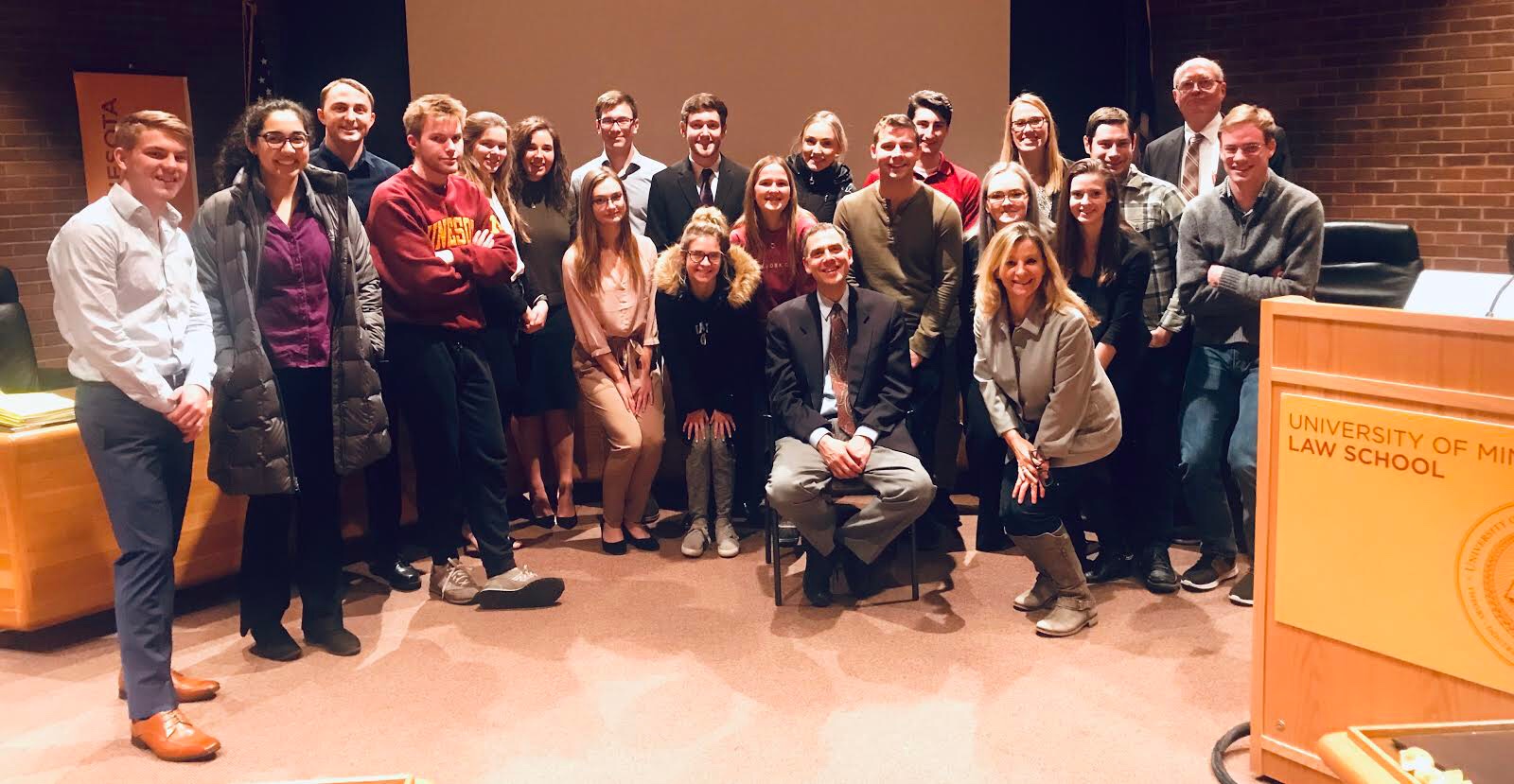
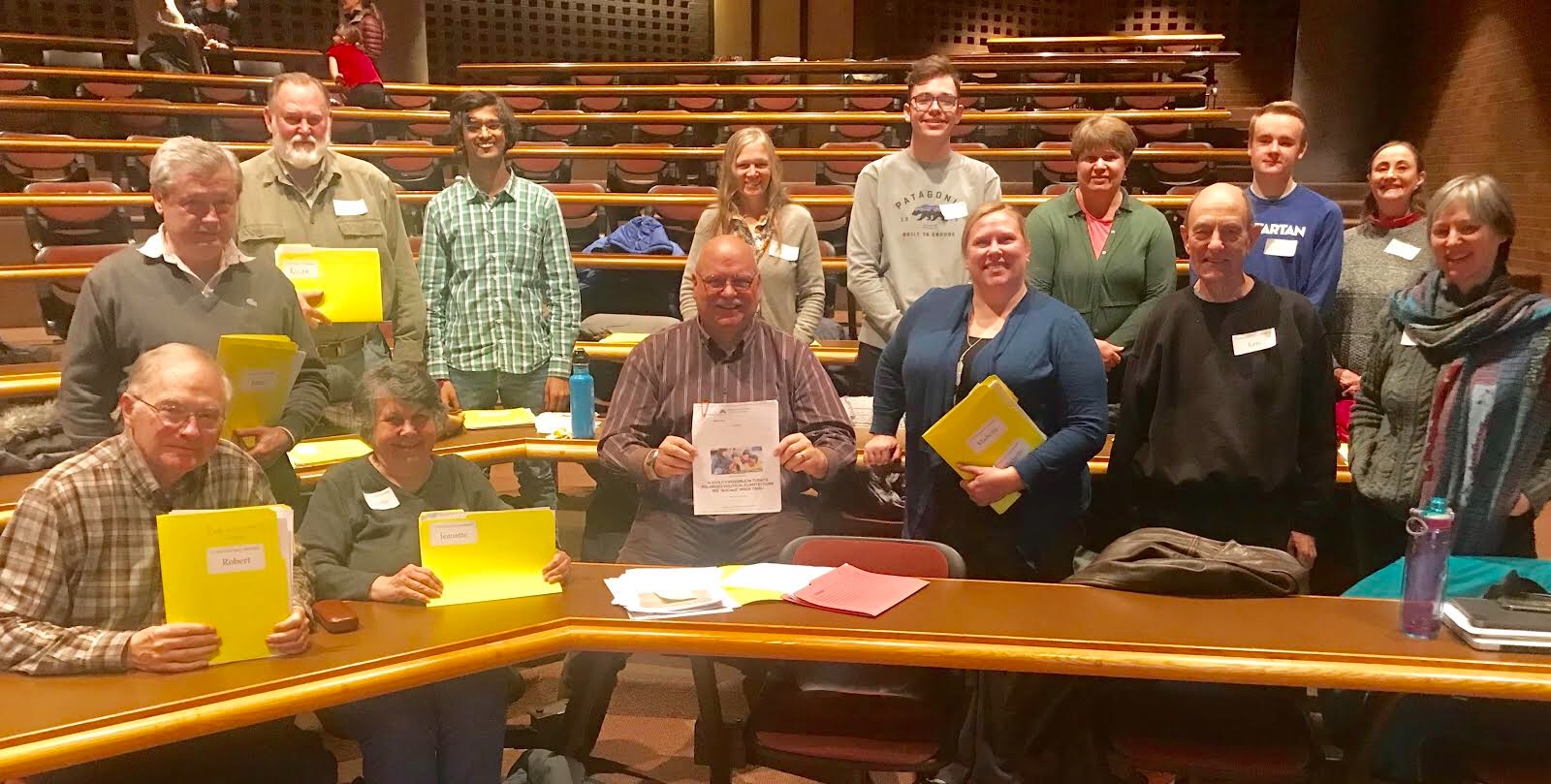
This was a wonderful experience for the all the students in the class-the legal team, science team and the media team (that’s us!).
If you are reading this and wondering what the heck we are talking about, you can go to the post from last week that explains the first day of the SciCourt trial. You can read all about it in great detail or listen to Luke Diamond’s podcast summary.
That should bring you up to date. This week, the domains presented in the 1:1 technology case were about teacher attitudes, teacher training, opportunity and outcomes. At the end of the trial, there were closing arguments from the legal teams.
Now, for a complete summary of Day 2 of the SciCourt Trial.
It started right away with domain presentations from the Science Team. The first one up was Blake Paulson presenting on teacher attitudes:
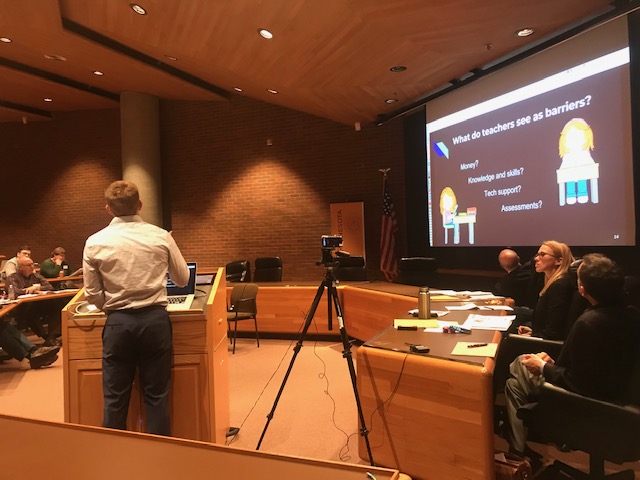
- Teachers attitudes (if they like or dislike technology in the classroom) can affect how welltechnology is integrated in the classroom
- How the kids use the technology (adding it to the curriculum or using it as a reward) can also depend on teacher attitudes
- The success of implementation can depend on teacher attitudes
- As more technology is used to teach upcoming teachers in college, those teachers might feel more comfortable using it in their own classroom
- Teacher attitudes are the biggest predictor of the success implementation
During the cross examination of Blake, the Pro Team pointed out how positive teacher attitudes can help success and schools with negative beliefs can change over time. The Con team highlighted how teachers with bad attitudes might not implement the technology effectively and how it would take more resources outside of supplying one-to-one computers or iPads in order to change teacher attitudes.
Next up: Daniel Meyer presenting on teacher training:
- Some teachers may lack the skills to effectively use the tech
- Professional development can teach those with bad attitudes how to use technology effectively in classrooms
- Putting a mentor who knows how to teach with technology into schools is one of the best ways to help implementation
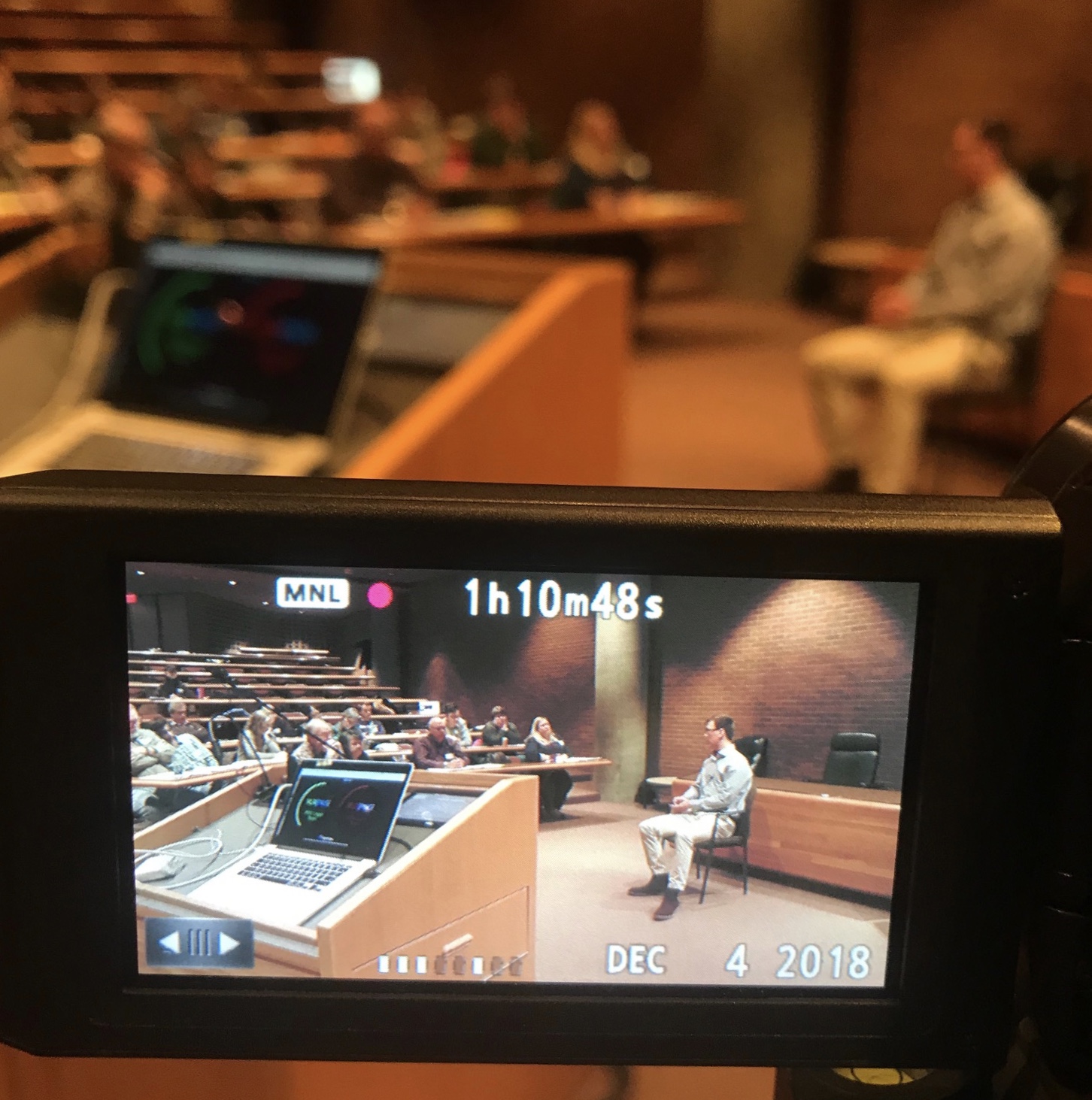
Not only did the legal team have some questions for Daniel, the jury had a couple of their own.
Note: one of the features of Science Court that is different than a traditional trial is that the jury can ask questions to the domain experts through the judge. They can write down their questions and the judge then reads them and asks the question on their behalf. Pretty cool! They wanted to know:
- What type of training seemed to be the most effective?
- The mentor program worked better than the teacher groups
- Can you explain what you meant when you mentioned how the studies addressed the difference between subjects?
- The differences between the subjects was insignificant as far as how well the tech was implemented compared to teacher tech use at home and comfort with tech
- How does adding tech require more time from teachers?
- The mentor program meant that problems were solved quickly rather than making the teacher take the time to learn it on their own
Our last domain presenter was Samantha Volkmeier presenting about opportunity and outcome disparity:
She looked specifically at how socioeconomic status, gender, ethnicity, and native language affect implementation
- Socioeconomic status-In low socioeconomic schools, teachers had to spend more time teaching basic tech skills, but in higher socioeconomic schools, because they had more resources, they were more comfortable implementing tech
- Gender-Girls are more likely to use tech to work collaboratively where boys are more likely to use the tech more independently
- Minorities want to use the tech more but are less comfortable using it on their own
- Native Language-Overall the findings are mixed as to whether or not it has any impact on implementation
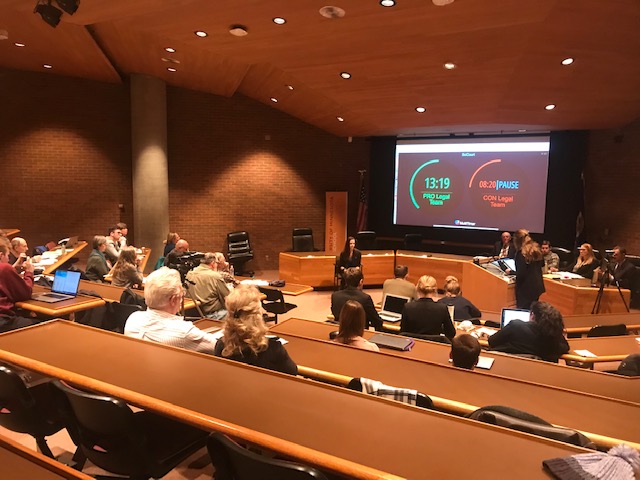
On cross examination, the Pro Team brought up how some studies were published earlier than 2009 meaning children could have more access to tech now then in the studies. The Con Team focused on how socioeconomic status plays into implementation, specifically, how in lower socioeconomic schools, because they spend more time on basic skills, time is taken away from preparing for standardized tests. They also mentioned how teachers in lower socioeconomic schools worry more about the ability of students to use the tech at home, so the are less likely to use it.
With that all the domain presentations were done! The Science Team members could relax. They did their job. The jury now had all the information they need to hopefully come to a decision. The only thing left to do was have the Legal Team present their closing arguments. This was both sides last chance to try and convince the jury, by summarizing all the evidence that supports their sides.
First up was Bayley McMenimen giving the Closing Argument for the Pro Team. She argued that a 1:1 Tech program should be implemented by calling attention to ways that 1:1 Tech is beneficial:
- Technology becoming increasingly more crucial in the workplace
- How 1:1 tech can increase those crucial tech skills in the next generation
- Technology increasing the individualization of student learning
- In regards to the students who come from a lower socioeconomic background, they will not be negatively affected
- Although student mental and physical health can be negatively affected by screen time, the studies did not differentiate between recreational screen time and educational screen time
- Teacher attitudes can improve with more tech experience and training
- In regards to concerns about the cost of the program, the program would be a positive investment that could decrease the cost of other things like textbooks
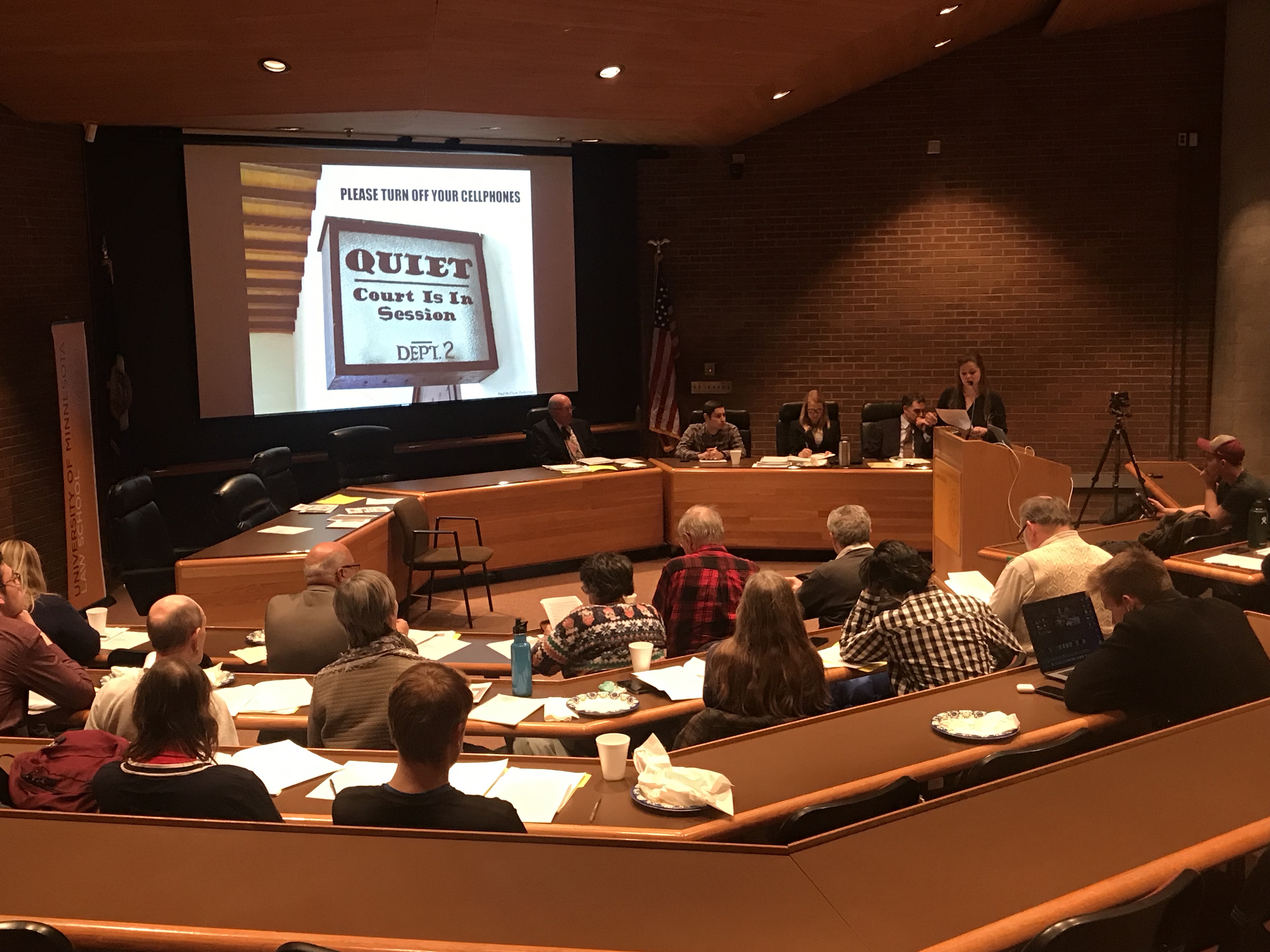
Matthew Nichols presented the Closing Argument for the Con Team. He argued that a 1:1 Tech policy should not be implemented by emphasizing some of the problems with 1:1 Tech:
- As far as student performance in concerned, there is some positive results but with a program this big there should be a clear and substantial positive result
- Health risks associated with screen time and sedentary behavior also exist. This could have a negative effect on the children
- If the program is implemented there are further barriers
- Teacher attitudes need to be addressed
- Technology can be distracting to students
- The real outcome of increasing tech (things like wages and college enrollment) is inconclusive, so we don’t know if it will be beneficial in the long run
- This program is not guaranteed to help everyone but it is going to cost us all
Once the Con Team was done with their Closing Argument the Pro Team was given the chance to respond to what was said in a Rebuttal. Grace Lundgren gave the rebuttal focusing on:
- How the mental and physical impacts would be small
- Students already have access to tech for recreational use so access to a school device would not change that
- Concerns with implementation can be solved with a well-planned program
- The program would increase necessary tech skills
- Distractions are possible and prevalent without technology
- Teachers could block things like games and other distractions on the school devices
With a couple last minute questions from the jury, the very first SciCourt Trial is DONE Professor Tadmor was ecstatic that his vision for this class was a success!
The jury went into deliberation and will have a verdict on Tuesday (December 11th), in Walter Mondale Law School Room 25 at 6pm. There will be a public discussion about SciCourt and the case. The point of this discussion is to hear what the public and the jurors think. If you want to hear straight from the jurors or just want to know more about SciCourt directly from the people involved, we would love to see you there! Our media team will also be showing a short documentary video that summarizes what happened during this semester.